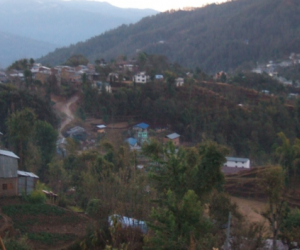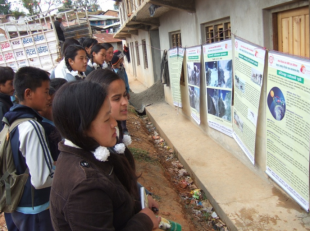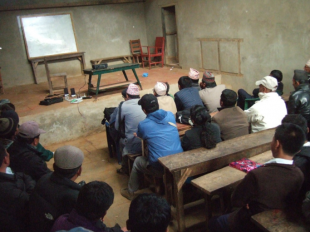Submitted by admin on

On February 17, Nepal Climate Change Knowledge Management Center organized Climate Change Awareness Program at Diktel, headquarter of remote mid hill district Khotang in eastern region of Nepal. Newly constructed earthen road has connected Diktel with low land urban area. According to the report on Climate Change Vulnerability Mapping for Nepal published by Government of Nepal, Khotang district is at very high risk from Glacial Lake Outburst Flood (GLOF).
 In the outset of the program, Professor Dr Prakash Chandra Adhikari, Secretary, NAST gave scientific information on climate change and its impacts. Mr Ishwor P Khanal, Chief, Faculty of Science explained the role of NAST in climate change research while Dr Bimala Devkota, Chief, NCCKMC explained the activities of NCCKMC. The team organized Climate Quiz at the premise of ShreeSaraswoti Secondary School. Altogether seven schools participated in the quiz program. Shree Bidhodaya HSS bagged first prize, while Shree Saraswoti HSS stood second and Shree Diktel Boarding School stood third in the competition. Mr Dipak Raj Nepal, Chief District Officer and NAST's team gave the prizes. About 500 students, teachers from the participating schools, Chief District Officer, Local Development Officer, District Education Officer, Higher School. Chair Person of School Management Committee, School's Principal, representatives of police and armed police, journalists and representative of political parties observed the program. Mr Nirmal Kumar Ghimire, District Education Officer said that the program acquainted the students on fundamentals of climate change science and climate change impacts. Local community radio station in the region, Radio Halesi 104.2 MHz had live broadcast of the program, which covered nearby districts Bhojpur, Udayapur and Okhaldhunga as well.
In the outset of the program, Professor Dr Prakash Chandra Adhikari, Secretary, NAST gave scientific information on climate change and its impacts. Mr Ishwor P Khanal, Chief, Faculty of Science explained the role of NAST in climate change research while Dr Bimala Devkota, Chief, NCCKMC explained the activities of NCCKMC. The team organized Climate Quiz at the premise of ShreeSaraswoti Secondary School. Altogether seven schools participated in the quiz program. Shree Bidhodaya HSS bagged first prize, while Shree Saraswoti HSS stood second and Shree Diktel Boarding School stood third in the competition. Mr Dipak Raj Nepal, Chief District Officer and NAST's team gave the prizes. About 500 students, teachers from the participating schools, Chief District Officer, Local Development Officer, District Education Officer, Higher School. Chair Person of School Management Committee, School's Principal, representatives of police and armed police, journalists and representative of political parties observed the program. Mr Nirmal Kumar Ghimire, District Education Officer said that the program acquainted the students on fundamentals of climate change science and climate change impacts. Local community radio station in the region, Radio Halesi 104.2 MHz had live broadcast of the program, which covered nearby districts Bhojpur, Udayapur and Okhaldhunga as well.
 On the same day, the team organized an interaction program with district level governmental officials, journalists, representatives of political parties and NGOs on mainstreaming climate change risk management in local development plans. The interaction program started with climate change documentary show. The participants and students together watched the documentaries. Participants said that the intensity of snow fall at their locality is being decreased and the springs are getting dry up day by day. They demanded for the preparation of district level climate change adaptation plan. Mr Pawan Neupane, an environmentalist in the team interacted with the students and discussed on the climate change queries raised by them.
On the same day, the team organized an interaction program with district level governmental officials, journalists, representatives of political parties and NGOs on mainstreaming climate change risk management in local development plans. The interaction program started with climate change documentary show. The participants and students together watched the documentaries. Participants said that the intensity of snow fall at their locality is being decreased and the springs are getting dry up day by day. They demanded for the preparation of district level climate change adaptation plan. Mr Pawan Neupane, an environmentalist in the team interacted with the students and discussed on the climate change queries raised by them.
